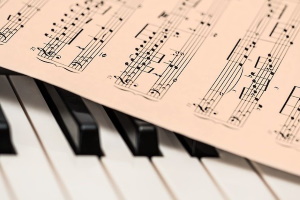How long does it take to study for a single grade of Music Theory?
Music theory is a truly vast subject, and it’s possible to spend your entire lifetime studying it without ever reaching the end! The UK exam boards (as well as AMEB in Australia, RCM in Canada, and AP in the USA, to name a few others) focus on a small sub-section of music theory, which is mostly based on Western art (“classical”) music. (Trinity exam board in the UK does branch off a little more). They mostly do not cover topics such as jazz, non-Western music, orchestration, acoustics and so on. But all of these exam boards begin with a thorough training in the basics of Western notation, harmony and instruments, which should set you up to continue learning, in whichever direction interests you.
TQT and GLH

Exams of all kinds are given a TQT rating by the accrediting examining board. TQT stands for “total qualification time”, and is a combination of the time spent studying with a teacher (also known as GLH or Guided Learning Hours) and time spend studying independently.
The ABRSM publishes its TQTs for the eight music theory exam grades. You can download the offical document from their website here. In a nutshell, the TQT for each music theory grade is as follows (Trinity exams are broadly similar):
| Grade | TQT |
| 1 | 20 hours |
| 2 | 30 hours |
| 3 | 50 hours |
| 4 | 58 hours |
| 5 | 90 hours |
| 6 | 130 hours |
| 7 | 170 hours |
| 8 | 210 hours |
This figure can give you a broad idea of how it will take to study for an exam, but in reality this is simply an average and many learners will need considerably less, or more time. What does it depend on?
Grades 1-5 vs. Grades 6-8 (ABRSM)
There is a big difference in the type of content in the earlier ABRSM music theory grade exams, compared to the higher three levels. Trinity exams have a smoother trajectory.
Grades 1-5 ABRSM basically require you to learn musical facts, and then give those facts as answers. A “fact” might be a particular scale, or what an ornament is, or what a key signature stands for, for example.
In grades 6-8 ABRSM, 50% of the exam is skills-based, and your answers will be creative. You will need to write music – harmony, or melody, or both. (Grades 1-5 used to include a skills-based composition question, but the ABRSM sadly removed this in 2018). For most students, the gap between grades 5 and 6 is very large, because learning skills tends to be more difficult than just learning facts. For this reason, you should not assume that you will sail through ABRSM grade 6 theory quickly, if you found the earlier grades quite easy – they are a different kind of exam.
Do you have a teacher?
If you do, you will probably learn more quickly. If you have 1-1 tuition, you will probably make fast progress, whereas if you are learning in a group, the larger the group, the less effective it is likely to be. It will also of course depend on the individual skills of your teacher.
How old are you?
Age does make a difference, but the picture is complicated. Children tend to pick up new information more quickly than adults, but when the information is complex age is on your side. For the early grades (1-5), young children (from age 9-ish upwards) will probably learn fairly quickly, but the higher grades (6-8) may well prove too advanced for a student who is younger than around 14. This is because the higher grades are very analytical, and analytical learning needs a more mature brain than fact-learning. All adults know that the brain declines in power as they get older, but there is no upper age-limit for learning new things. Older learners have an added advantage in that they have often mastered the skill of “learning” itself – they are good at organising their time, and better at self-motivation.
Are you a passive or active learner?
If you listen to a teacher, read books, watch videos or demonstrations and complete exercises, you will certainly learn. However, you will probably learn a lot more quickly if you engage in more active tasks.
If you question your teacher, make notes from booksand videos, and act on feedback exercises, your progress will be very much better. Whether you have a teacher or not, your studying can be active. One of the best ways to learn something is to try to explain it to someone else – even if they don’t know much about the subject matter, the very process of you explaining will stimulate your own mind and expose areas that you only vaguely understand (you can’t explain something you don’t really understand!). Whether you have exercises marked by a teacher, or whether you are checking them yourself from an answer key, the important point is that you need to act on the results. Make a list of your mistakes and try to discover patterns. Ask yourself why you made a mistake – was it a slip in concentration, or is there something you need to read up on? Do you tend to make the same sort of errors? If so, how can you remind yourself not to commit the same errors next time?
Use strategies like flash cards, mnenomics, word associations etc. to help you memorise facts or processes.
How often and for how long do you study?
Let’s take grade 6 as an example. The TQT is 130 hours. Clearly we do need to sleep, so assuming 10 days a day studying, can a person achieve grade 6 in just 13 days? It’s extremely unlikely! There is a limit to how much new information we can take in per day, and the more complicated the subject matter, the shorter your concentration span will be.
In fact, research suggests that we learn while we are asleep. This doesn’t mean you need to try to listen to music theory lectures through ear-phones while sleeping though! You study during the day, but it is during sleep that you brain sorts out that learning, and puts it into your long-term memory. (I recommend reading The Talent Code by Dan Coyle for a fascinating look at how we learn).
For grade 6, most people will find it quite hard going. At this grade twenty minutes of study at a time is enough for many people. If you study 20 minutes per day, every day, then grade 6 will take 390 days, or just over a year, However, you are likely to find it less complicated as you go along, so your maximum daily study time might increase as time goes by. Let’s say you study for 40 minutes per day, every day- this will halve the study time and might be very effective, but on the other hand, you are not likely to actually be able to study every day if you have a normal life!
It seems likely that the best solution is little and often – study in fairly short sessions, but do them as frequently as you can.
How motivated are you?
Adults who make the decision to study something new later in life are normally pretty motivated to get on and achieve. Children on the other hand, may not feel motivated at all. If your child has been told they “have to” study theory in order to progress with their instrument, they are likely to feel resentful, and learning will be slow. Children who are introduced to theory as an interesting subject in its own right, often decide that they really like it, and the motivation comes from within themselves. Too many children are forced into suddenly swotting up for grade 5 theory to be “allowed” to take grade 6 – most of these scrape a pass and detest every minute. Some children are put under pressure to study higher grades as a status symbol in their social group, and this can cause a lot of distress. If you have a child who seems to be making painfully slow progress, ask yourself whether it is really the right thing for them to be doing.
So how long does it take?!
Bearing in mind all the points above, (and the obvious fact that some people are quick learners and others are less so), in my experience the average time it takes most people to pass ABRSM grades 1-5 music theory is around 3 months per grade. Each grade is cumulative, so a complete beginner might manage grade 5 after a year to 18 months.
Grade 1 often takes a bit longer than grades 2-4, because the student is more familiar with theory papers by the later stages, and there is not a huge jump between the grades. Usually the student has also progressed in their performance instrument, and will have learned a reasonable amount of theory just from reading music.
Grade 6 can be done by a hard-working high-achiever in 3 months. Most students take at least 6 months.
Grade 7 is often glossed over. Many people elect to skip the actual exam, and just work through study materials. Grade 7 is doable in 4-5 months and is not a huge step up from grade 6.
Grade 8 is quite a challenge, and most students need at least 6 months to get to grips with the necessary skills.
Is Music Theory Difficult to Learn?
No! Some aspects of music theory are harder than others of course, but nothing is difficult to learn if you approach it in the right way. One problem that many people find (or think they find) in learning music theory, is that it can come across as a bunch of dry rules which don’t appear to make sense in the real world. Another problem is that people don’t find it easy to hear what they see written down, just by looking at the notes. Let me address both of these points.

Music theory is written down in words, because it’s a language for discussing or analysing music, so that we can teach it, and talk about it. Music theory is not a “bunch of rules” at all; it is just a description of what happens in real-life music.
When we begin to learn music theory, we usually start off with the simplest ideas (to avoid difficulty), and this means studying the music which was written roughly between the years 1700-1800 (e.g. by JS Bach, pictured left). The rules we learn are describing the music of that time. The exercises you are asked to do in a theory exam are also based on that style.
As music styles progressed, each style became more complicated to describe. This is because during 1700-1800 composers were more interested in creativity within the confines of accepted rules, whereas from c.1800 onwards, composers were more interested in creativity without the confines of rules. This did not happen overnight of course. It was a gradual transformation, until we reach the highly experimental music of the 20th and 21st centuries. When composers do not stick to an accepted set of rules, creativity explodes, but it becomes a much more complicated situation to describe.
This is why we begin with the simpler, more controlled Baroque/Classical era. It does not mean that all music must conform to those rules – far from it! And this is also why many of the “rules” we learn appear to be continually broken in the music we play. Music theory is descriptive, not prescriptive.
Being able to “hear what you see” (or audiate) is a really useful skill. Most theory books take it for granted that you can hear music by looking at it, in the same way that most adults can read words without saying them out loud.
But the reality is that most people are not good audiators. It is a skill that can easily be learned, but like any other skill, it requires time and practice.

If you are at the stage where audiation is a challenge, you will probably find that learning music theory from a book is frustrating. I would recommend that you play (or sing, if possible) any written examples on you find while reading, but also take a few minutes each to try to increase your audiation skills.
Can you learn music theory online without a teacher?
Yes! The wonders of modern technology are perfect for learning music theory. Instead of struggling with a “silent” book, or trying to fix up expensive lessons into an already busy schedule, you can learn at your leisure and hear what you are learning, with audio-visual learning.
MyMusicTheory.com includes a complete set of video courses, from beginner to advanced level, ABRSM and Trinity, which will teach you in a logical order and which provide demos, audio examples and walkthroughs of every topic.
You can download PDF practice questions and tests, and contact me at any time if you are stuck, need some guidance or even just want to share you discoveries or successes.
Head on over to the MyMusicTheory video courses platform (mymusictheory.newzenler.com) to explore what’s on offer!